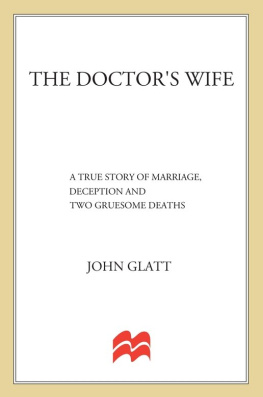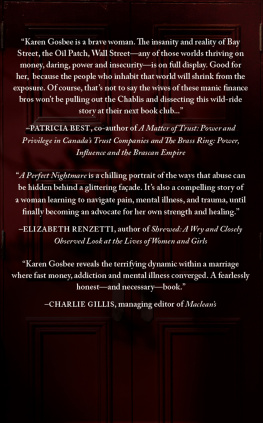This book is the result of more than a years work and intensive interviews with many of the key people involved in the case. I owe a great debt of gratitude to the Hatfield family, who cooperated with me fully with my research. Especially helpful was Karens sister Kathleen Lembo and brother Jamie, who painfully relived their memories of Karens childhood and her courtship by Richard Sharpe. I was also helped by Karens father, John Hatfield Sr., and elder brother, John Jr. Unfortunately after several telephone calls the Sharpes daughter Shannon declined to be interviewed for this book.
I would also like to thank Jacob Atwood and his staff of Mark Smith and Erin Shapiro for their continuing patience and help through the project and arranging my initial introduction to the family. I am also grateful to Assistant D.A. Bob Weiner for all his help.
Much gratitude is also owed to: Dr. Keith Ablow, Connie Behnke, Karen Beswick, Chuck DeLorio, Jacqueline Feeney, Theodore Johnson, Scott Kilman, Denise LeClair, Henry Nash, Chief Andy Shagouri, Desi Smith, Tony Surina, Michelle Trioli and Eugene Woolfe.
As always I would like to thank my editor at St. Martins Press, Charles Spicer, and his team, Joseph Cleemann, Joshua Rivkin and Anderson Bailey, and my agent, Peter Miller and Nathan Rice.
Thanks also to: Susan Chenery, Roger Hitts, Daphna Inbar, Danny and Allie Trachtenberg, Cari Pokrassa, Benny Sporano, Virginia Randall and Wensley Clarkson.
In addition to my own interviews, I was able to draw on helpful and informative broadcast source material from Dateline NBC on May 14, 2002 and Court TVs gavel-to-gavel coverage of the trial of Dr. Richard Sharpe in November 2001.
In the days after Richard Sharpes sentencing, there was a sense of closure for Karens family, as they tried to move on from the nightmare and return to a normal life. Mikey and Ali, who were aware of their fathers trial, had now settled down and were happy living with the Lembos and their two young daughters.
In December, a month after Richard Sharpe started serving his sentence in the Walpole Penitentiary, it was reported that he had settled the wrongful death suit brought by Karen Sharpes estate, agreeing to pay her family $5 million. Under the terms of the settlement, Mikey, now 8, and Ali, now 5, would receive what is left of their fathers fortune, which had reportedly dwindled to just $1.9 million, out of which $600,000 is owed to lawyers, including $175,000 to Sharpes defense team.
So far the familys civil suit against Alden Tarr Jr. remains unresolved, although in March 2002, Kristen Dormitzer dropped her action against Sharpes estate, saying she wanted Mikey and Ali to receive all the money. But the blonde ex-student decided to use her fifteen minutes of fame from the murder trial to embarkon a modeling career. She found an agent in Florida and adopted the professional name of Christiane, explaining in her biography how she had been a witness to a highly publicized murder and she had appeared in newspapers and television.
I had been contacted by several modeling scouts who encouraged me to turn a bad situation into something more positive, said her modeling bio. That is now what I am doing.
But if the family hoped that Sharpe would now disappear from their lives, they were wrong. In March 2002, from behind bars at Walpole, he was accused of hatching an audacious plot to murder Essex County Assistant D.A. Robert Weiner, whom he now apparently blamed for his life sentence. He offered a fellow inmate $100,000 to take out a hit on the prosecutor, but instead the prisoner alerted jail authorities. Sharpe was immediately placed in solitary confinement as the jail launched a full investigation, and later charged in Norfolk County with soliciting a fellow inmate to kill the prosecutor.
A few days later, on Saturday, March 30, Sharpe tried to hang himself with his shoelaces. He was then admitted to the New England Medical Center in critical but stable condition, prompting suspicions that it was another ploy to get moved to a less secure prison environment.
The family still feared he might escape and come after them. The nightmare never ends, said Kathleen Lembo. Its just something that we have to deal with.
Shannon Sharpe, who only heard the news when she was called by a reporter for comment, was said to be terrified that her father planned to escape and kill his family.
Were really frightened of him, she told Boston Herald reporter Tom Farmer. Hell never, as long as he lives, stop trying to harm people.
In late August 2002, a 39-year-old New Jersey nurse named Debbie Keiser-Myers revealed that Richard Sharpe had almost talked her into marriage from behind prison bars. In an emotional interview with the Boston Herald , the attractive single woman admitted that she had watched his trial on Court TV and felt so sorry for him that she had written him a letter of sympathy. Sharpe immediately replied and began courting her with a series of sexually charged letters and collect telephone calls, where he declared his undying love.
In his letters he ridiculed his insanity defense, admitting it was merely an act to allow him to serve out his time in the comparative comfort of a mental hospital.
As part of my defense strategy, he wrote on January 25, 2002, my brilliant lawyer tried to make me look crazy, out of control, violent, on the verge of a sex-change operation, etc. Not only did the strategy fail, but it neutralized most of the sympathy that I might have gotten otherwise.
He went on to explain that although some women like Keiser-Myers had shown sympathy, all the cross-dressing publicity had turned macho males against him.
Well, fuck it, wrote Sharpe. Any male who isnt comfortable in fishnet stockings, spiked heels and a leather miniskirt can go to hell!
In February he mulled over the possibilities of their future relationship if he could engineer a move to Bridgewater State Mental Hospital, which would allow contact visits.
Can you visit and let me kiss you? he wrote her. Ireally want to just tear clothes off of you and make passionate love to you.
In another letter soon afterwards, he considered undergoing a sex change so he would be transferred out of Walpole to the womens prison in Framingham.
It might be worth it, he mused. It would also generate a lot of publicity for the book-movie. If I go this route and then get out of prison, would you consider having a lesbian relationship with me?
A few weeks later, when Keiser-Myers visited him in Bridgewater State Mental Hospital after his failed suicide attempt, Sharpe asked her to marry him, suggesting he officially propose on national television during an upcoming Dateline NBC one-hour special on his case, currently in production.
He was all over me, kissing me, until the guards screamed at him, she said.
The nurse finally broke off their six-month relationship in the summer when she realized he was just playing games with her and she owed $1,000 in collect telephone calls. Now, she told the Boston Herald , she was coming forward so he would not be able to dupe any more gullible women.
Hes that smooth, she explained. He goes for sympathetic, compassionate women. [I] thought I could help him.
During earlier correspondence after his trial, Sharpe displayed absolutely no remorse for killing Karen, still apparently blaming her for his predicament. Saying the divorce had driven him nuts, he attacked Karen for leaving him without any provocation. Sharpe blamed Karen and her lawyer Jacob Atwood for filing affidavits accusing him of everything from alcohol abuse to drug abuse, cross-dressing and physical abuse.













